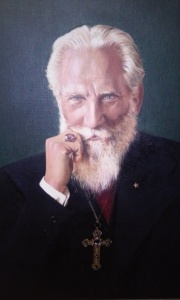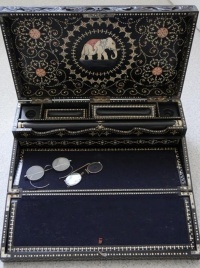Leadbeater writings: Difference between revisions
| (One intermediate revision by the same user not shown) | |||
| Line 52: | Line 52: | ||
* '''''The Other Side Of Death''''' (1903). | * '''''The Other Side Of Death''''' (1903). | ||
* '''''An Outline Of Theosophy''''' (1902). | * '''''An Outline Of Theosophy''''' (1902). | ||
* '''''The Power and Use of Thought''''' (1911). | * '''''[https://archive.org/details/power-and-use-of-thought The Power and Use of Thought]''''' (1911). Seventh edition at Adyar, Madras, India: Theosophical Publishing House, 1987. | ||
* '''''Spiritualism And Theosophy''''' (1928). | * '''''Spiritualism And Theosophy''''' (1928). | ||
* '''''A Textbook Of Theosophy'''''. 1912. Reprinted by the same press in 1947, 1956, 1967, 1971, 1975. Also printed by Theosophical Press in Wheaton, Illinois in 1946. Available in 1912 edition at [http://www.gutenberg.org/ebooks/12902 Project Gutenberg] and on several databases. | * '''''A Textbook Of Theosophy'''''. 1912. Reprinted by the same press in 1947, 1956, 1967, 1971, 1975. Also printed by Theosophical Press in Wheaton, Illinois in 1946. Available in 1912 edition at [http://www.gutenberg.org/ebooks/12902 Project Gutenberg] and on several databases. | ||
Latest revision as of 21:28, 20 September 2024
Charles Webster Leadbeater (1847-1934) was a very prolific writer of Theosophical book, pamphlets, and articles. In 1897 he was awarded the Subba Row Medal for his contributions to Theosophical literature. Often he collaborated with Annie Besant in writing about esoteric subjects. Young people such as Basil Hodgson-Smith and Fritz Kunz assisted with his massive correspondence, and Ernest Wood helped to compile some of the books.
Background and writing style
Helena Petrovna Blavatsky died in 1891. Two years before that event, Annie Besant had come into the Theosophical Society. She became Leadbeater’s closest collaborator in clairvoyant investigation. He himself was increasingly in demand as a speaker and made many lecture tours, at first in Europe and then further afield. He also came to have a substantial output of books, pamphlets and articles. With such titles as listed below his books came, as the years went by, to have quite a dominant position in the literature of modern Theosophy. He also wrote a volume of occult stories, The Perfume of Egypt.
As a writer, Leadbeater had a clear simple style of considerable distinction and could convey his meaning with great lucidity. He was not, however, an atmospheric writer, nor had he the novelist’s capacity to present a character. Those of his writings which are only transcripts of talks he gave are less crisp and more inclined to be repetitive, particularly in his old age.
The clarity and lucidity of his writings may at times have obscured his meaning by making what he said seem to easy and liable to be understood at too superficial a level by the less thoughtful reader. Many turned to his writings because they made lighter reading than the heavier style and less colloquial vocabulary of Madam Blavatsky.
Leadbeater’s clarity of description may have contributed, for some readers, to the illusion that the products of clairvoyance depend for their value only on their factual or informative content and can be tested by that criterion in the same way as the products of material scientific research. What he wrote was often regarded as more objective than such matter can possibly be. The extent to which the experimenter or observer is himself part of the experiment, though to some extent appreciated by Leadbeater, was not in those days as widely understood as it is today. While he had a very high regard for factual accuracy in psychic investigations, he valued what he saw and reported more for its moral implications, for the principles it suggested and for the indications it offered as to the right purpose to be followed in an active life, than for any attraction or interest it might have as mere information.
He was modest about his own clairvoyant descriptions and spoke of them as tentative pioneering efforts which would be far surpassed by what would come in the future. [1]
Research into Past Lives
Leadbeater’s research into the past lives of members of the Theosophical Society began in the 1890s but with the investigations into the lives of Jiddu Krishnamurti [Alcyone] it became a major preoccupation with him. In the April of 1910 a series entitled “Rents in the Veil of Time” began in The Theosophist and provided a graphic coverage of the past incarnations of various heroes and heroines, most of whom remained anonymously veiled by star names. Later compiled into book form as Lives of Alcyone, his writing supposedly spanned a period from 222662 B.C. to A.D. 624.
The occult methods whereby Leadbeater undertook this research were varied although sometimes he used one approach and sometimes a combination of them. The physical presence of the person whose past lives were being investigated was an advantage but not essential. One critic was Ernest Wood, who spent hundreds of hours in recording the Lives and felt that Leadbeater was using the imaginative faculty of the fiction writer, rather than clairvoyance as such. Whatever doubts some people may have had, the majority of Theosophists accepted the Lives.[2]
Books and pamphlets
Below are some of his titles, arranged alphabetically within topic. If the publisher is not otherwise identified, it is likely to be Theosophical Publishing House in Adyar, Madras, India or its affiliates in Wheaton, Illinois and London.
Autobiographical
- How Theosophy Came To Me (1930). Available at Singapore Lodge website and Global Grey eBooks.
Theosophy
- The Astral Plane: Its Scenery, Inhabitants, and Phenomena. " Written in expansion of an address delivered at a meeting of the London Lodge on the 21st of November, 1894."
- London: Theosophical Publishing Society; Benares: Theosophical Publishing Society; Madras: Theosophist Office, 1895. Available at Hathitrust.
- 3rd edition, revised - London: Theosophical Publishing Society and New York: J. Lane, 1898, 1900. Available at Internet Archive.
- 4th edition, revised - London, Theosophical Publishing Society and New York, J. Lane, 1905 and 1918. Available at Hathitrust, Books, and Internet Archive. Reprinted 1910, 1915.
- 5th edition - Los Angeles, Theosophical Pub. Society, 1918. Available at Google Books.
- 1st Adyar edition, revised and enlarged - Adyar, Madras, India: Theosophical Publishing House, 1933.
- 2nd Adyar edition, 1941.
- 6th edition, 1953, 1963, 1972, 1987.
- Also published in Spanish, French, German, Russian, Chinese, Japanese
- The Beginning of the Sixth Root Race (1931.)
- The Devachanic Plane (1896).
- Devas and Nature Spirits.
- The Hidden Side of Things. Available at AnandGholap.net.
- The Inner Life, First and Second Series (1910-11).
- Invisible Helpers (1896).
- The Life After Death (1912).
- Man's Duty Toward Nature.
- The Monad (1917).
- The Other Side Of Death (1903).
- An Outline Of Theosophy (1902).
- The Power and Use of Thought (1911). Seventh edition at Adyar, Madras, India: Theosophical Publishing House, 1987.
- Spiritualism And Theosophy (1928).
- A Textbook Of Theosophy. 1912. Reprinted by the same press in 1947, 1956, 1967, 1971, 1975. Also printed by Theosophical Press in Wheaton, Illinois in 1946. Available in 1912 edition at Project Gutenberg and on several databases.
- Theosophist’s Attitude to Death and the Unseen (1927)
- Thought-Forms. 1905. Note: the publication date is often incorrectly given as 1901. See "publication history" for details.
- 1905 edition at Internet Archive.
- 1905 edition at Hathitrust.
- 1905 edition at Google Books.
- Illustrations from the 1905 Benares edition at Fulltable.
- One of the Wheaton editions at Anandgholap.net.
- 1999 edition is available in various commercial eBook formats.
Human constitution and abilities
- The Aura. Pamphlet.
- The Chakras (1927).
- Clairvoyance (1899).
- Man Visible And Invisible (1902).
Spiritual path and occultism
- The Masters And The Path (1925) Available from Anand Gholap website, Internet Archive, Ascension Research Center, and Theosophy World.
- Some Glimpses of Occultism, Ancient and Modern (1903).
- Talks on ‘At the Feet of the Master’ (1922).
- Talks On The Path Of Occultism (1926).
Occult investigations
Mr. Leadbeater worked with Annie Besant, C. Jinarājadāsa, Ernest Wood, Dora van Gelder Kunz, and others to examine the world using occult vision. Several books resulted from this work:
- Occult Chemistry (1908)
- The Occult History Of Java (ph 1951)
Leadbeater also turned his clairvoyance towards the past lives of people around him, which he published first in the 1910-1911 series of articles, "Rents in the Veil of Time" in The Theosophist.
- The Lives of Alcyone, Vol. I and II (1924). Available in three parts at Ahandgholap.net and at the Lives of Alcyone website created by the Blavatsky Lodge of the Theosophical Society at Mumbai, including all the color illustrations.
- Soul’s Growth Through Reincarnation, Vol. I - II, Lives of Erato and Spica (ph 1941)
- Soul’s Growth Through Reincarnation, Vol. III, Lives of Orion (ph 1946)
- Soul’s Growth Through Reincarnation, Vol. IV - VI, Lives of Ursa, Vega and Eudox (ph 1948)
- Soul’s Growth Through Reincarnation, Vol. VII - X, Lives of Ulysses, Abel, Arcor and Vale (ph 1950)
- Man: Whence, How And Whither (1913) 1947 edition is available at Internet Archive and AnandGolap.net.
Christianity
- The Christian Creed: Its Origin and Signification (1899)
- The Inner Side Of Christian Festivals (1920)
- The Science of the Sacraments (1920). This is an occult investigation into the Christian sacraments. Dora Kunz and other clairvoyants worked with Leadbeater on this volume. According to Dora's friend Ed Abdill, all the sensitives had to agree before CWL added anything to the book.
Buddhism
- The Noble Eightfold Path (1926).
- The Smaller Buddhist Catechism (1889).
Freemasonry
- Glimpses of Masonic History (1926).
- The Hidden Life in Freemasonry (1926).
Other topics
- Dreams (1895).
- New Charter; a Discussion of the Rights of Men and The Rights of Animals.
- Our Relation To Children (ph 1938).
- The Perfume of Egypt (1911).
- Starlight (1917).
- To Those Who Mourn (1913).
- Vegetarianism and Occultism (1913).
- The World-Mother As Symbol And Fact (1928).
Articles
Mr. Leadbeater contributed numerous articles to Theosophical periodicals. Many of the articles are indexed in the Union Index of Theosophical Periodicals. About 1395 articles are listed under the name CW Leadbeater and over 440 under the initials CWL.

